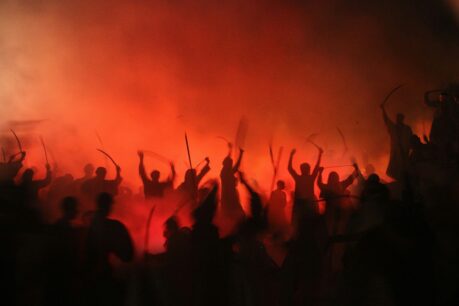The Armed Forces and the War on Terror
Kola King, November 24, 2023
Terrorism has bared its fangs once again with the killing of 36 soldiers in Niger State on August 13, bringing to the fore the devastating effect of the war on terrorism on both the military and the civilian populace. This is a stark reminder that the battle against terrorism is far from over despite the government’s repeated stance that the terrorists have been degraded and that the armed forces have won the war against terrorism.
Over the past twelve years, the armed forces have faced a toil of sweat, tears, and blood in the ongoing war against terrorists. Apart from the toll on the armed forces, terrorism has also resulted in the deaths of thousands of civilians in the past ten years with the attendant consequence of millions being displaced from their ancestral homelands. There are an estimated 2 million people in Internally Displaced Persons, IDP camps in the Northeast and Northwest as well as the North Central states due to terrorism.
Since the Nigeria Security Tracker, NST, a project of the Council on Foreign Relations Africa programme, started collecting the data on May 29, 2011, when former President Goodluck Jonathan was inaugurated, no fewer than 98,083 Nigerians had been killed, reports Vanguard.
Naturally, the death of 36 soldiers including three officers in an ambush in Niger State was heart-wrenching and came as a rude shock to the nation, confirming the worst fears that the terrorists had spread their tentacles further afield to parts of the Northwest region, especially Niger State. This would be the second attack in Niger State in the space of twelve months. Indeed, some of the officers killed in the ambush were among the finest in the armed forces.
According to reports, the officers and men were on a reconnaissance mission to root out terrorists when they were ambushed by the suspected terrorists. In the ensuing gunfire, 14 soldiers were killed while seven others received varying degrees of injury. What’s worse, a Nigerian Air Force Mi-172 helicopter on the casualty evacuation to convey the dead soldiers and the wounded back to Kaduna later crashed on its way to its destination around Chukuba village in Shiroro Local Government Area of Niger State. Both the pilot and copilot and two crew members were killed in the air crash along with the soldiers they were conveying back to Kaduna. The deceased crew members include Flight Lieutenant Adamu Ibrahim, Flight Lieutenant Anthony Duryumus, Lance Corporal Alaribe Daniel, and Lance Corporal Briggs Stephen Peter.
NAF spokesman, Edward Gabkwet said the cause of the crash was yet to be determined, saying operations were ongoing to unravel the cause of the accident.
Dogo Gide, the notorious leader of a group of bandits that has been a source of terror across parts of northwestern Nigeria bordering the countries of Niger and Chad, has claimed responsibility for the attack, according to news reports. The NAF’s spokesman has dismissed the claims made by Gide.
The warlord, an ethnic Fulani from Niger state, has been linked to Ansaru, a faction of Boko Haram that drifted westwards from the restive northeast, reports Al Jazeera but could not independently verify the claim at the time of this report.
According to Samuel Aruwan, former Kaduna State Commissioner for Internal Security and Home Affairs, Major SA Oni DHQ Commanding Officer, Special Forces was among the dead soldiers. Aruwan noted that Oni was reputed for courage. He attributed the peace being enjoyed in Kaduna to the courageous forays by Oni and his troops in the battle against bandits and terrorists in several flashpoints in the State.
Aruwan spoke of the successes recorded in the anti-banditry and anti-terrorism campaigns in the Northwest, saying Major Oni’s role remains indelible and outstanding.
The toll of the war on terror on the armed forces cannot be over-emphasized. According to news reports, terrorists had launched 500 attacks on military bases, and killed 1,952 Nigerian soldiers within five years of Buhari’s Administration, according to a Nigeria Security Tracker.
Besides terrorists on the rampage across the country have attacked about 16 military bases killing approximately 750 soldiers in the last 18 months, fuelling concerns that the military was overstretched and needed to re-strategise to deal with the criminals, protect its personnel, and tackle the security challenges.
Meanwhile, Sunday PUNCH enumerated the series of attacks on the military between 2020 and 2022, which gives a graphic illustration of the enormity of the security situation. Most of these attacks on the military bases have been concentrated especially in the North.
For example, in 2022, there were six major attacks on military bases, witnessed in Borno, Katsina, Kaduna, Taraba and Niger states. These were independent of other attacks on the military, including ambushes, attacks on their convoys, and the most recent attack on soldiers was at the Zuma Rock checkpoint on July 28. A soldier was killed in the attack.
Also, on April 4, suspected Ansaru terrorists attacked a military base at Polewire on the Kaduna-Birnin Road in Birnin Gwari Local Government Area of Kaduna State, during which 11 soldiers were killed, while 19 soldiers were reportedly injured by the terrorists. The terrorists, who used Rocket-Propelled Grenade, also killed three members of a vigilante group and injured two.
In a similar vein, it was reported that ISWAP fighters attacked the multinational military base in Doron Baga, Kukawa Local Government Area of Borno State on March 19. They were, however, repelled by soldiers attached to Operation Hadin Kai, killing some of the terrorists. Reports said the terrorists came with five-gun trucks and grenades but were eventually decimated by the soldiers after about a two-hour gun battle.
In January 2021, Boko Haram/ISWAP fighters attacked the New Marte Base in Borno State. The military disclosed to journalists that the terrorists were repelled through the collaborative efforts of Operation Lafiya Dole and the Nigeria Airforce.
In February, a few kilometers from Dikwa Town in Borno State, Boko Haram terrorists attacked the military’s super camp in the area. Reports indicated that the attack was meant to gain access to the United Nations base and control of the town, but they were repelled by soldiers of Operation Lafiya Dole and other military formations. The number of casualties was not disclosed by the military.
Meanwhile, the terrorists also attacked the Nigeria Defence Academy, Afaka Campus, Kaduna in August 2021. The news reports said that they killed two officers while one Major Christopher Datung was kidnapped, while another officer was hospitalized. Datung was later rescued by the military.
On September 12, terrorists also attacked the Forward Operation Base, Mutumji, Dansadau LGA, Zamfara State, killing at least 12 security operatives. Nine Airmen, two policemen, and one soldier were reported as casualties of the clash between the soldiers and the terrorists.
Furthermore, the reports said that ISWAP terrorists attacked the United Nations base in Rann, in the same month. They attacked the strategic base which is located near the border between Nigeria and Cameroon to gain control of the border town. A UN security source disclosed that a soldier and a local volunteer with a foreign aid agency were killed. While the military confirmed the attack on the base, it said troops restored calm without being dislodged from their camp.
On November 8, 2021, suspected ISWAP fighters attacked a military base in Tamsukawu, a village in Kaga Local Government Area of Borno State. The Commander, Sector 3 of Civilian Joint Task Force, Modu Fannami, told journalists that the few soldiers at the base engaged the attackers in a heavy gun battle but did not disclose the number of casualties on both sides.
In November 2021, Brigadier General Dzarma Zirkusu, and three other officers of the Nigerian Army, were killed by ISWAP fighters when they attacked a military base in Askira in the Uba LGA of Borno State in the same month. Three other soldiers were reportedly killed at Bulgama, a few kilometers from Askira town.
In December, members of ISWAP stormed the military base in Rann, in the Kala Balge LGA of Borno State. Six soldiers were reportedly killed while about 20 terrorists died in a battle to overrun the base.
Meanwhile, about 750 soldiers lost their lives between the third quarter of 2020 and July 2022. Findings, however, showed that about 35 soldiers were killed between May and July 2022, a development some retired generals and security experts described as unacceptable.
In another development, six soldiers of the 93 Battalion, Takun, were killed on May 10 when suspected terrorists ambushed a convoy carrying the commanding officer of the Battalion while on his way to Jalingo, the Taraba State capital.
Also, 20 military personnel were killed by terrorists during an attack on a mining firm located in Ajata-Aboki in Gurmana Ward of Shiroro Local Government Area of Niger State on June 30, 2022.
Another set of terrorists on July 22 attacked some officials of the 7 Guards Battalion of the Nigerian Army Presidential Guards Brigade, Abuja killing eight soldiers, including a captain and a lieutenant.
Generally, the breaches in military formations have reduced considerably as the military has taken the battle to the terrorists. Regretably most of the current attacks on the military have been through the movement of convoys and ambushes in the course of smoking out terrorists from their hideouts.
The war on terror is a far cry from the conventional warfare the military is trained to fight. This is an asymmetrical warfare that has taken its toll on the military. Though the armed forces have adapted to the changing circumstances of warfare by coming up with Special Forces and Super Camps to deal with the growing security challenge, all this pales into insignificance against the seeming invisibility of the terrorists who appear to be well-armed with high-grade weapons. That’s why the military must strategize both kinetic and non-kinetic methods of fighting this war. It’s becoming dangerous to put our soldiers in harm’s way without adequate cover and adaptation of technology such as drones and aerial surveys conducted by the Airforce before such encounters are undertaken against the terrorists, which is why it’s more or less a suicidal mission sending the troops into such battles without complementary technological support and cover. Most importantly there is an urgent need for the troops to be equipped with modern technologies to win the war on terror.
You may also like

Eyes of the Beholden
Unspoken desires linger in the shadows of a teacher's life, revealed through art

LOST
Bessie's odyssey through stormy nights, lost love, and secret graveyards unfolds with haunting beauty in "Lost" by Sandra Dennis.

Water Rising
Amidst a flood, a woman grapples with the past, and confronts the consequences in this haunting narrative of resilience.

Book Review: White Nights by Urszula Honek
The debut short story from Polish writer Urszula Honek, White Nights, is akin to reading an account of a haunted place – one that is beautiful and devastating in equal

Beyond the Surface: The Multifaceted Lives of ‘American Fiction’
In essence, "American Fiction" and the experiences it draws from remind us that we are indeed more than the sum of our parts.

Beyond the Surface: The Multifaceted Lives of ‘American Fiction’
The narrative of “American Fiction” unfolds with a dual focus: it not only scrutinizes the unique pressures faced by Black creatives but also delves into the intricate and sometimes tense…

Uncle Bobby’s Funeral
Reluctant family faces the eccentricities of Uncle Bobby's funeral in swampy Chipley.








